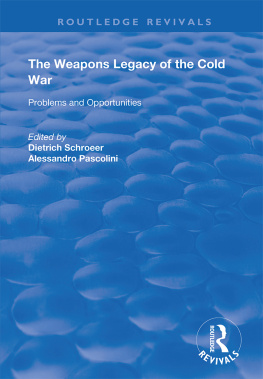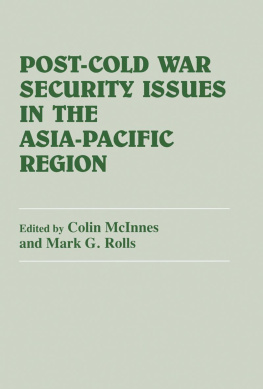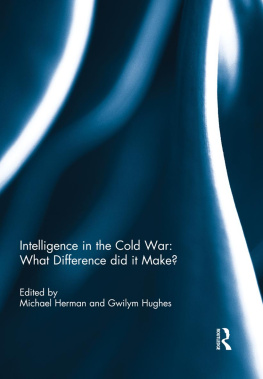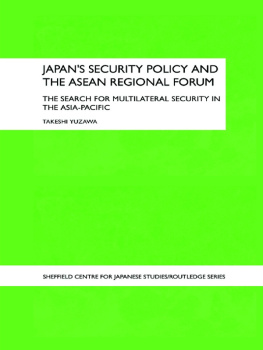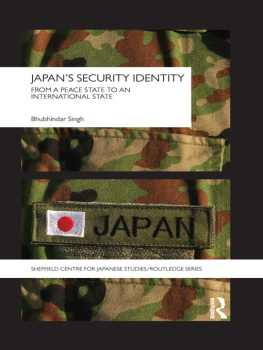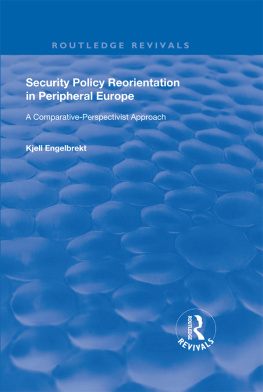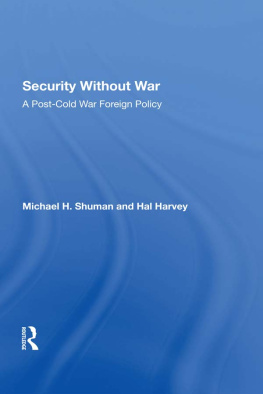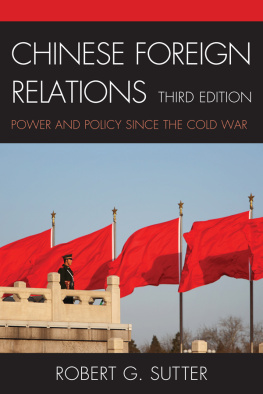First published 1997 by Ashgate Publishing
Reissued 2018 by Routledge
2 Park Square, Milton Park, Abingdon, Oxon, OX14 4RN
52 Vanderbilt Avenue, New York, NY 10017
Routledge is an imprint of the Taylor & Francis Group, an informa business
Copyright Dietrich Schroeer and Alessandro Pascolini 1997
All rights reserved. No part of this book may be reprinted or reproduced or utilised in any form or by any electronic, mechanical, or other means, now known or hereafter invented, including photocopying and recording, or in any information storage or retrieval system, without permission in writing from the publishers.
Notice:
Product or corporate names may be trademarks or registered trademarks, and are used only for identification and explanation without intent to infringe.
Publisher's Note
The publisher has gone to great lengths to ensure the quality of this reprint but points out that some imperfections in the original copies may be apparent.
Disclaimer
The publisher has made every effort to trace copyright holders and welcomes correspondence from those they have been unable to contact.
A Library of Congress record exists under LC control number: 97019614
Typeset by Manton Typesetters, 5-7 Eastfield Road, Louth, Lincolnshire LN11 7AJ, UK.
ISBN 13: 978-1-138-36605-3 (hbk)
ISBN 13: 978-0-429-43048-0 (ebk)
The chapters in this volume were presented to the 18th summer course of the International School on Disarmament and Research on Conflicts (ISODARCO) held at the Certosa di Pontignano (Siena), Italy, between 29 July and 8 August 1996.
The organization of the school was made possible by the financial contributions of two organizations and the generous collaboration of several individuals without which these meetings would have not been possible and to whom goes our deepest gratitude: The John D. and Catherine T. MacArthur Foundation; Prof. Alessandro Pascolini and Prof. Dietrich Schroeer, directors of the course and editors of the book; the Physics Department of the University of Rome 'Tor Vergata'; Prof. Maria Vegni, of the Biology Department of the University of Siena; The Regional Council of the Toscana Region; Dr Isabella Colace of the ISODARCO office in Rome. For hospitality we are indebted to Mr Andrea Machetti and all the personnel of the Certosa di Pontignano.
All opinions expressed in the chapters of this book are of a purely personal nature and do not necessarily represent the official view of either the organizers of the school or of the organizations with which the writers may be affiliated.
Carlo Schaerf
(President of ISODARCO and Director of the School)
Georgi Arbatov (Russia) is the Director of the Institute for the USA and Canada, as well as a member of the Russian Academy of Science. He is the author of The System: An Insider's Life in Soviet Politics.
Eric Arnett (USA) is leader of the Project on Military Technology at the Stockholm International Peace Research Institute. He is the author of the annual chapter on 'Military Research and Development' in the SIPRI Yearbook, as well as editor of Nuclear Weapons after the CTB and Military Capacity and the Risk of War.
Oleg Bukharin (Russia) works on arms control issues at the Moscow Institute of Physics and Technology, and at Princeton University where he is currently a staff member of the Program on Nuclear Policy Alternatives.
Francesco Calogero (Italy) is Professor of Theoretical Physics, University of Rome I 'La Sapienza'. He is currently on leave while serving as Secretary General, Pugwash Conferences on Science and World Affairs. Together with M. de Andreis he has recently published a SIPRI Research Report, The Soviet Nuclear Weapons Complex.
Anatoli S. Diakov (Russia) is Professor of Physics at the Moscow Institute of Physics and Technology where, together with Frank von Hippel, he has established the Center for Arms Control, Energy and Environmental Studies. His current activities include work on plutonium disposition, transparency and nuclear arms reduction.
Ioury E. Federov (Russia) is Professor of Political Science in the Department of Political Science of the Moscow State Institute of International Relations of the Ministry of Foreign Affairs of the Russian Federation.
Gert G. Harigel (Switzerland) is an Emeritus Senior Physicist at CERN (Organisation Europeene pour la Recherche Nucleaire). He is a founding and council member of the International Network of Engineers and Scientists for Global Responsibility and secretary/treasurer of the Geneva International Peace Research Institute.
Hilal Khashan (Lebanon) is Associate Professor of Political Science at the American University of Beirut. He is currently on study leave in the Department of Political Science at the Florida State University. He has written Inside the Lebanese Confessional Mind and Partner or Pariah.
Patricia Lewis (UK) is the Executive Director of the Verification Technology Information Centre in London. She was a consultant to the UK government during the CFE Treaty negotiations and has published widely on the verification of arms control and disarmament treaties.
Arto Nokkala (Finland) is a retired lieutenant-colonel (GSO) and former Senior Research Officer of the Department of Strategic Studies in the Finnish National Defence College. Currently he is a visiting researcher at the Tampere Peace Research Institute of the University of Tampere, Finland.
Alessandro Pascolini (Italy) ( co-editor ) is Professor of Physics at the University of Padua and Vice President of ISODARCO.
Dietrich Schroeer (USA) ( co-editor ) is Professor of Physics at the University of North Carolina at Chapel Hill. He developed a course on science, technology and military affairs and is author of Science, Technology and the Nuclear Arms Race.
Hartwig Spitzer (Germany) is Professor of Physics at the University of Hamburg and a member of its Center for Science and International Security. He has been co-organizer of several conferences on security issues and global development problems. He is currently chairman of the International Network of Engineers and Scientists for Global Responsibility.
Frank von Hippel (USA) is Professor of Public and International Affairs, Princeton University, and chairman of the Research Arm of the Federation of American Scientists.
Lamberto Zannier (Italy) is Head of Disarmament, Arms Control and Cooperative Security of the North Atlantic Treaty Organization.
Ciro E. Zoppo (USA) is Research Professor Emeritus of International Relations in the Political Science Department of the University of California at Los Angeles. His most recent publication is The Future Role of the United States in European Security.

